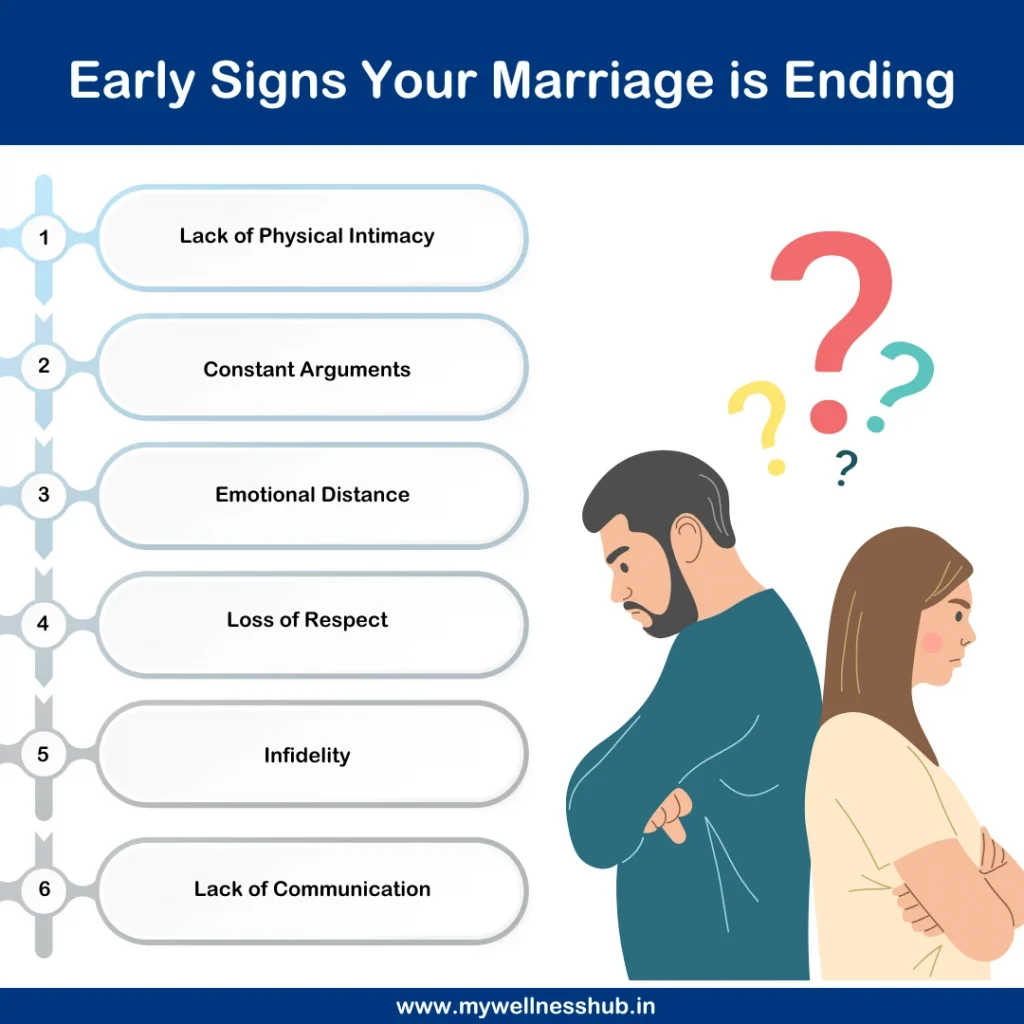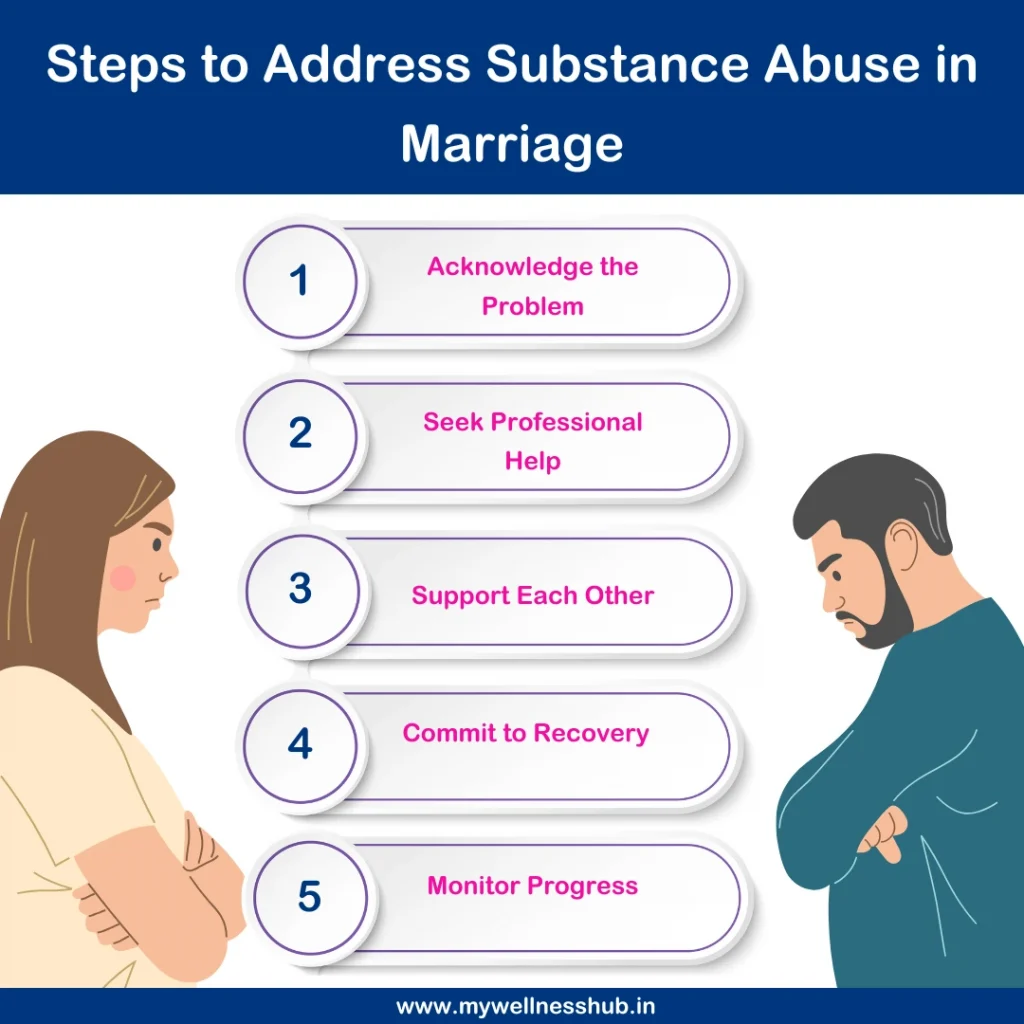15 Signs Your Marriage is Ending
By Prapoorna M
Last Updated: January 18, 2025
Recognizing the signs that your marriage is ending can be incredibly challenging. Many couples start their journey with high hopes and dreams, but over time, unexpected challenges and persistent issues can lead to a breakdown in the relationship. It’s essential to be aware of these signals early on, as it can provide you with the opportunity to either work on saving the marriage or prepare for a respectful and peaceful separation.
Identifying these signals isn’t just about acknowledging problems; it’s about understanding the root causes and the extent of the issues. This awareness can help you take the necessary steps to address and potentially resolve them. If the issues are beyond repair, recognizing them early can help both partners transition smoothly into their new lives, minimizing emotional and psychological damage.
Also Read: 5 Signs that your marriage is falling apart

1. Lack of Physical Intimacy
Physical intimacy is a crucial component of a healthy marriage. It goes beyond just sex—it includes simple gestures like holding hands, hugging, and kissing. These acts of physical touch are vital for bonding, expressing love, and providing comfort to your partner. When these gestures become rare or nonexistent, it can be a clear signal that your marriage is facing trouble.
Imagine a time when you felt close and connected to your spouse, often sharing a warm hug or a loving kiss. Now, picture a scenario where these moments are few and far between, or completely absent. This lack of physical connection can create an emotional distance, making it harder to communicate and understand each other. The absence of physical intimacy can lead to feelings of loneliness and rejection, further straining the relationship.
2. Constant Arguments
Every marriage has its share of disagreements, but constant and unresolved arguments can indicate deeper issues within the relationship. Healthy debates and occasional conflicts are normal, as they allow both partners to express their views and work towards mutual understanding. However, when arguments become a daily occurrence and remain unresolved, it’s a sign that there are significant problems at play.
Think about the last few times you and your spouse had an argument. Was it over something trivial? Did it escalate quickly and end without resolution? If so, this pattern of frequent and unresolved arguments is a red flag. Constant fighting not only drains your energy but also erodes the foundation of your marriage. It can lead to a buildup of resentment and bitterness, making it difficult to maintain a loving and supportive relationship.
Read more: Better ways to communicate in relationships
3. Emotional Distance
Emotional availability is a cornerstone of any strong marriage. Sharing your feelings, thoughts, and fears with your partner creates a deep bond and fosters a sense of security and intimacy. When one or both partners become emotionally distant, it can lead to a significant disconnect in the relationship.
Imagine the last time you shared a personal concern or achievement with your spouse. If their response felt indifferent or dismissive, it might have left you feeling isolated. Over time, this emotional gap can widen, creating a sense of loneliness even when you are physically together. Emotional distance often manifests through a lack of meaningful conversations, reduced empathy, and a general disinterest in each other’s lives.
4. Loss of Respect
Mutual respect is the foundation of a healthy and lasting marriage. It involves valuing each other’s opinions, appreciating each other’s qualities, and treating each other with dignity. When respect is lost, it can erode the relationship irreparably.
Consider the ways in which you interact with your spouse. Do you still listen to their views with interest, or do you dismiss them out of hand? Disrespect can manifest in various ways, from belittling comments to ignoring each other’s needs and boundaries. When respect diminishes, so does the willingness to compromise and cooperate, leading to a breakdown in communication and understanding.
Comparison of Healthy vs. Unhealthy Marriages
| Aspect | Healthy Marriage | Unhealthy Marriage |
|---|---|---|
| Communication | Open and honest communication, where both partners feel heard and understood. | Closed and deceptive communication, leading to misunderstandings and secrecy. |
| Conflict Resolution | Conflicts are resolved constructively and respectfully, focusing on finding solutions. | Conflicts are resolved destructively and disrespectfully, often escalating issues. |
| Emotional Connection | Strong and supportive emotional bond, providing comfort and empathy. | Weak and distant emotional connection, leading to feelings of isolation. |
| Physical Intimacy | Regular and affirming physical intimacy, including gestures of love and affection. | Rare or absent physical intimacy, resulting in a lack of connection and affection. |
| Trust | High level of trust and transparency between partners, fostering a secure relationship. | Low level of trust, with secrets and lies undermining the relationship. |
| Financial Management | Joint and responsible management of finances, with shared goals and mutual decision-making. | Separate and irresponsible financial behaviors, leading to conflicts and mistrust. |
5. Infidelity
Infidelity can severely damage the trust and intimacy that form the bedrock of a healthy marriage. When a partner cheats, it often leads to feelings of betrayal, hurt, and anger. Trust, once broken, can be incredibly difficult to rebuild, and the emotional wounds from an affair can linger for a long time.
In some cases, couples can recover from infidelity if both partners are willing to work through the pain and rebuild their relationship. This typically involves open communication, counseling, and a strong commitment to move past the betrayal. However, ongoing unfaithfulness is a much more serious issue. Repeated infidelity indicates deeper problems in the marriage, such as unresolved conflicts, lack of satisfaction, or fundamental incompatibility.
Know more: How to Overcome Infidelity in Marriage? | What if you found them guilty?
Steps to Rebuild Trust After Infidelity
| Step | Description |
|---|---|
| Acknowledge the Betrayal | The unfaithful partner must acknowledge their actions and understand the impact on their spouse. |
| Open Communication | Both partners need to discuss their feelings openly and honestly, fostering transparency and understanding. |
| Seek Counseling | Professional guidance can provide strategies for rebuilding trust and addressing underlying issues. |
| Set Boundaries | Establish clear boundaries to prevent future infidelity and ensure both partners feel secure. |
| Show Commitment | The unfaithful partner must demonstrate commitment through consistent actions, not just words. |
| Practice Patience | Rebuilding trust takes time; both partners need to be patient and supportive throughout the process. |
6. Lack of Communication
Open and honest communication is essential for a strong and healthy marriage. It allows partners to express their thoughts, feelings, and concerns, fostering understanding and connection. When communication breaks down, misunderstandings and resentment can quickly build up, creating a significant rift between partners.
Imagine trying to navigate your daily life without being able to discuss your worries, joys, or plans with your spouse. This lack of communication can lead to feelings of isolation and frustration. Small issues that could have been easily resolved through conversation can grow into major conflicts due to misunderstandings.
7. Financial Problems
Financial stress can be one of the most challenging issues for a marriage to withstand. Money troubles can cause tension, arguments, and anxiety, which can strain the relationship significantly. Whether it’s due to job loss, debt, or differing spending habits, financial problems require careful management and mutual understanding.
Irresponsible financial behavior by one partner can be particularly damaging. This might include excessive spending, hiding debts, or making significant financial decisions without consulting the other. Such actions can lead to a breakdown of trust and resentment. When one partner feels that their financial stability is at risk because of the other’s actions, it can create a significant rift in the relationship.
8. Substance Abuse

Substance abuse can have a devastating impact on a marriage. Addiction to alcohol, drugs, or other substances can lead to erratic behavior, neglect of responsibilities, and emotional and physical harm. When one partner is struggling with substance abuse, it can create a toxic environment that is harmful to both partners and any children involved.
Seeking help for substance abuse is essential. Rehabilitation programs, counseling, and support groups can offer a pathway to recovery and help restore the relationship. However, if the partner with the addiction is unwilling to seek help or make changes, it becomes a significant deal-breaker. The continuous cycle of addiction can lead to a breakdown of trust, safety, and stability in the marriage.
9. Avoidance of Home
When you or your partner starts finding excuses to stay away from home, it can be a strong indicator of unhappiness in the marriage. This behavior often stems from a desire to avoid conflict, discomfort, or simply the emotional burden associated with being together. Whether it’s staying late at work, spending excessive time with friends, or finding reasons to be out of the house, avoidance can signal deep-seated issues.
Imagine coming home to an environment that no longer feels welcoming or supportive. The thought of being with your spouse might fill you with anxiety or dread, leading you to seek solace elsewhere. Over time, this avoidance can lead to further disconnection, as both partners spend less time together and miss opportunities to communicate and bond.
10. No Shared Interests
Shared interests and activities are crucial for maintaining a strong bond in a marriage. They provide opportunities for partners to connect, have fun, and create lasting memories together. When couples no longer have common interests or activities, it can signal a drifting apart.
Think about the activities you used to enjoy together, whether it was cooking, traveling, or watching movies. If these shared interests have dwindled and been replaced by separate hobbies or pursuits, it can create a sense of isolation. Leading separate lives with little overlap can make it challenging to maintain the closeness and intimacy that a healthy marriage requires.
11. Feeling Relieved When Apart
Feeling relieved when you’re not around your spouse can be a significant indicator of a desire for separation. When you find more peace and happiness in your own company or when you are with others, it may signal deep-seated issues within your relationship. This relief often stems from the emotional strain and discomfort experienced when you are together.
Think about how you feel when your spouse is away. Do you feel a sense of freedom and relaxation? Do you dread their return? If being apart brings a sense of relief, it’s a clear sign that your marriage is in trouble. This feeling suggests that being together is more stressful than comforting, which is contrary to the essence of a healthy marriage.
Explore more: Life after Breakup | How to deal with separation?
12. Constant Criticism
Constant criticism can erode a marriage over time, indicating deep-rooted incompatibility. When one or both partners are always finding faults, it creates a negative atmosphere that is hard to escape. Criticism can be about anything—from small habits to significant behaviors—and if it’s relentless, it can damage the self-esteem and morale of the criticized partner.
In a healthy relationship, partners uplift and support each other, addressing issues constructively rather than through constant fault-finding. Focusing solely on negatives prevents any positive aspects of the relationship from being acknowledged or appreciated. This imbalance can lead to a build-up of resentment and frustration.
13. Secrets and Lies
Keeping secrets and telling lies can destroy the foundation of trust that a healthy marriage relies on. Transparency between partners is crucial for fostering an environment of honesty and security. When secrets start to creep into the relationship, it creates a barrier between partners, making it difficult to maintain a close and trusting bond.
Imagine discovering that your spouse has been hiding something significant from you. The immediate reaction is often one of betrayal and hurt. Even small lies can snowball into larger issues, leading to a breakdown of communication and trust. In a strong marriage, both partners should feel comfortable sharing their thoughts, feelings, and actions openly.
14. Inability to Forgive
Forgiveness is a vital component of resolving conflicts and moving forward in any relationship. Holding grudges and being unable to forgive can create a toxic environment that hinders growth and reconciliation. When partners cannot forgive each other, it leads to ongoing resentment and bitterness, which can erode the relationship over time.
Consider the last time you had a disagreement with your spouse. Were you able to resolve it and forgive each other, or did the issue linger, causing ongoing tension? The inability to forgive keeps past hurts fresh in the mind, preventing both partners from healing and rebuilding their connection.
15. Counseling Has Failed
Marriage counseling can be a powerful tool for couples experiencing difficulties, providing a space to communicate and work through issues with professional guidance. However, when counseling sessions prove ineffective, it can indicate that the problems are too deep or complex to resolve.
Think about the efforts you and your spouse have made to salvage your relationship through counseling. If, despite your best efforts, there has been little to no improvement, it might suggest that the issues are irreparable. This can be disheartening, especially when both partners have invested time and energy into trying to make things work.
Discover more about Signs that You Need to Meet a Marriage Counsellor
Conclusion
Recognizing the signs that your marriage is ending is crucial for making informed decisions. From the lack of physical intimacy and constant arguments to deeper issues like financial problems, substance abuse, and ongoing criticism, these signals can help you understand the state of your relationship. Early recognition of these signs gives you the chance to either work on saving the marriage or prepare for a respectful separation.
Addressing these issues directly is important. Seeking professional help, whether through counseling or support groups, can provide valuable guidance. At Wellness Hub, we offer resources and expert advice to help you navigate these tough times. Visit our Wellness Hub website for more information and support. Remember, acknowledging the signs early and taking action can significantly improve your emotional well-being and overall happiness. Don’t hesitate to seek the help you need to make the best decisions for your future.
Frequently Asked Questions:
1. What are the early signs that my marriage is ending?
Early signs that your marriage is ending include a lack of physical intimacy, constant arguments, and emotional distance. Other signs may include financial problems, substance abuse, and ongoing criticism.
2. How can I tell if my marriage is beyond repair?
Your marriage might be beyond repair if you experience persistent issues like loss of respect, infidelity, lack of communication, and a general feeling of relief when apart from your spouse.
3. Can a marriage recover from constant arguments?
While occasional arguments are normal, constant and unresolved arguments can indicate deeper issues. Seeking professional help such as marriage counseling can sometimes help couples address and resolve these conflicts.
4. How does financial stress affect a marriage?
Financial stress can strain a marriage by causing tension, arguments, and anxiety. Irresponsible financial behavior by one partner can lead to mistrust and resentment, further damaging the relationship.
5. What impact does substance abuse have on a marriage?
Substance abuse can have a devastating impact on a marriage, leading to erratic behavior, neglect of responsibilities, and emotional and physical harm. Seeking help is essential, but if the partner with the addiction is unwilling to change, it can be a deal-breaker.
6. Why is emotional distance a sign of a failing marriage?
Emotional distance indicates a lack of emotional availability and sharing between partners, leading to feelings of loneliness and isolation. This disconnect can weaken the bond and intimacy in the marriage.
7. How important is forgiveness in a marriage?
Forgiveness is crucial for resolving conflicts and moving forward in a relationship. Holding grudges can create a toxic environment, preventing both partners from healing and rebuilding their connection.
8. What should I do if marriage counseling fails?
If marriage counseling fails despite your best efforts, it may indicate that the issues are irreparable. Accepting this reality can help both partners consider alternative paths forward, possibly leading to a more peaceful separation.
9. Why does keeping secrets harm a marriage?
Keeping secrets can destroy the trust essential for a healthy marriage. Transparency between partners fosters honesty and security, while secrets create barriers and mistrust.
10. When should couples seek professional help for their marriage?
Couples should seek professional help when they notice persistent issues such as constant arguments, emotional distance, infidelity, or substance abuse. Early intervention can provide valuable guidance and support in addressing these challenges.
About Author
Prapoorna Mangalampalli
M.Sc., M.A., (Dual Masters in Psychology and Senior Content Developer) – Counselor (6+ years of experience)
Prapoorna, with dual Master’s degrees in Psychology and English and over 6 years of experience, elevates human experiences through insightful counseling. She excels in online therapy, marital relationships, child family, and career counseling. At Wellness Hub, she thrives in a team environment, valuing innovation, compassion, and client success.
Connect with Prapoorna to find your voice and build a brighter future.
Book your Free Consultation Today
Parent/Caregiver Info:
Client’s Details:
* Error Message









